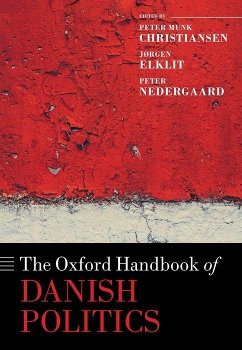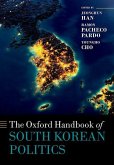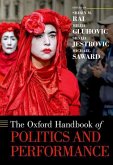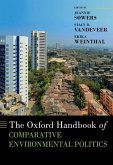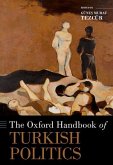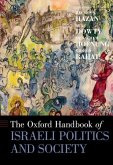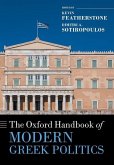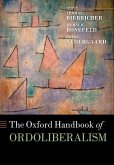The Oxford Handbook of Danish Politics
Herausgeber: Munk Christiansen, Peter; Nedergaard, Peter; Elklit, Jørgen
The Oxford Handbook of Danish Politics
Herausgeber: Munk Christiansen, Peter; Nedergaard, Peter; Elklit, Jørgen
- Gebundenes Buch
- Merkliste
- Auf die Merkliste
- Bewerten Bewerten
- Teilen
- Produkt teilen
- Produkterinnerung
- Produkterinnerung
The Oxford Handbook of Danish Politics provides the most comprehensive and thorough English language book on Danish Politics ever written.
Andere Kunden interessierten sich auch für
![The Oxford Handbook of South Korean Politics The Oxford Handbook of South Korean Politics]() The Oxford Handbook of South Korean Politics204,99 €
The Oxford Handbook of South Korean Politics204,99 €![The Oxford Handbook of Politics and Performance The Oxford Handbook of Politics and Performance]() The Oxford Handbook of Politics and Performance214,99 €
The Oxford Handbook of Politics and Performance214,99 €![The Oxford Handbook of Comparative Environmental Politics The Oxford Handbook of Comparative Environmental Politics]() The Oxford Handbook of Comparative Environmental Politics199,99 €
The Oxford Handbook of Comparative Environmental Politics199,99 €![The Oxford Handbook of Turkish Politics The Oxford Handbook of Turkish Politics]() The Oxford Handbook of Turkish Politics230,99 €
The Oxford Handbook of Turkish Politics230,99 €![The Oxford Handbook of Israeli Politics and Society The Oxford Handbook of Israeli Politics and Society]() The Oxford Handbook of Israeli Politics and Society214,99 €
The Oxford Handbook of Israeli Politics and Society214,99 €![The Oxford Handbook of Modern Greek Politics The Oxford Handbook of Modern Greek Politics]() The Oxford Handbook of Modern Greek Politics198,99 €
The Oxford Handbook of Modern Greek Politics198,99 €![The Oxford Handbook of Ordoliberalism The Oxford Handbook of Ordoliberalism]() The Oxford Handbook of Ordoliberalism206,99 €
The Oxford Handbook of Ordoliberalism206,99 €-
-
-
The Oxford Handbook of Danish Politics provides the most comprehensive and thorough English language book on Danish Politics ever written.
Hinweis: Dieser Artikel kann nur an eine deutsche Lieferadresse ausgeliefert werden.
Hinweis: Dieser Artikel kann nur an eine deutsche Lieferadresse ausgeliefert werden.
Produktdetails
- Produktdetails
- Verlag: Hurst & Co.
- Seitenzahl: 736
- Erscheinungstermin: 26. August 2020
- Englisch
- Abmessung: 254mm x 179mm x 50mm
- Gewicht: 1465g
- ISBN-13: 9780198833598
- ISBN-10: 0198833598
- Artikelnr.: 58458402
- Herstellerkennzeichnung
- Libri GmbH
- Europaallee 1
- 36244 Bad Hersfeld
- gpsr@libri.de
- Verlag: Hurst & Co.
- Seitenzahl: 736
- Erscheinungstermin: 26. August 2020
- Englisch
- Abmessung: 254mm x 179mm x 50mm
- Gewicht: 1465g
- ISBN-13: 9780198833598
- ISBN-10: 0198833598
- Artikelnr.: 58458402
- Herstellerkennzeichnung
- Libri GmbH
- Europaallee 1
- 36244 Bad Hersfeld
- gpsr@libri.de
Peter Munk Christiansen is Professor in the Department of Political Science, Aarhus University. He is the author of a large number of books, including textbooks, as well as a large number of contributions to edited books and articles in peer reviewed journals. His recent articles have been published in Nature Human Behaviour, Journal of Public Policy, Journal of European Public Policy, Public Administration, West European Politics, and Journal of Public Administration Research and Theory. Jørgen Elklit is Professor in the Department of Political Science, Aarhus University. His professional interests are elections and electoral systems, political parties, Danish politics, and democratization. He has published widely and also been active as an editor in these areas. Professor Elklit has also been active as an election and democratization expert and advisor since the early 1990s in more than 20 countries, including South Africa, Nepal, Kenya, Lesotho, Tanzania, China, and his native Denmark. Peter Nedergaard is Professor in the department of Political Science, University of Copenhagen. He is the author of a large number of books, including textbooks and edited volumes. He has published articles in the journals JCMS: Journal of Common Market Studies, Journal of European Public Policy, Journal of European Integration, Cooperation & Conflict, German Politics, and Scandinavian Political Studies. He is also the editor of the forthcoming edited volume on Ordoliberalism published by OUP.
* 1: Peter Munk Christiansen, Jørgen Elklit, and Peter Nedergaard:
Introduction: Why a Book on Danish Politics?
* Part 1: POLITY
* 2: Jens Peter Christensen: The Constitution
* 3: Ulrik Pram Gad: Greenland, the Faroe Islands, and Denmark: Unity
or Community?
* 4: Jes Fabricius Møller: The Monarch: Head of State and National
Symbol
* 5: Jørgen Elklit: The Electoral System: Fair and Well-Functioning
* 6: Kasper Møller Hansen: Electoral Turnouts: Strong Social Norms of
Voting
* 7: Helene Helboe Pedersen: The Parliament (Folketinget)
* 8: Martin Ejnar Hansen: The Government and the Prime Minister: More
Than Primus Inter Pares?
* 9: Caroline Howard Grøn and Heidi Houlberg Salomonsen: Organizing
Central Government: A Pragmatic Meritocracy?
* 10: Kurt Houlberg and Niels Ejersbo: Municipalities and Regions:
Approaching the Limit of Decentralization?
* 11: Peter Munk Christiansen: Corporatism: Exaggerated Death Rumours?
* 12: Mette Frisk Jensen and Gert Tinggaard Svendsen: Corruption and
Bureaucratic Reforms: 'Getting to Denmark'?
* 13: Mads Dagnis Jensen and Peter Nedergaard: Coordination for the
European Union: A Strong and Stable Institution
* Part 2: POLITICS
* 14: Christoffer Green-Pedersen and Karina Kosiara-Pedersen: Party
System: Open yet Stable
* 15: Christoffer Green-Pedersen and Asbjørn Skjæveland: Governments in
Action: Consensual Politics and Minority Governments
* 16: Gitte Sommer Harrits and Rune Stubager: Classes and Politics: A
Changing Relationship
* 17: Peter Thisted Dinesen, Rune Slothuus, and Rune Stubager: Danish
Public Opinion: Stability, Change and Polarization
* 18: Rasmus Mariager and Niels Wium Olesen: The Social Democratic
Party: From Exponent of Societal Change to Pragmatic Conservatism
* 19: Flemming Juul Christiansen: The Liberal Party: From Agrarian and
Liberal to Centre-Right Catch-All
* 20: Karina Kosiara-Pedersen: The Danish People's Party: Centre
Oriented Populists?
* 21: Henrik Bech Seeberg and Ann-Kristin Kölln: The Red-Green
Alliance: Is it Red or Green?
* 22: Kasper Møller Hansen and Rune Stubager: Dynamic Stability: The
Anchors of Voting Behaviour
* 23: Christina Fiig and Birte Siim: Gender and Politics: The Limits of
Equality Politics
* 24: Ulrik Kjær: Local Elections: Localized Voting Within a
Nationalized Party System
* 25: Derek Beach: Referenda in Denmark: Influence on Politics
* 26: Thomas Olesen: Media and Politics: The Danish Media System in
Transformation?
* 27: Anne Skorkjær Binderkrantz: Interest Groups: A Democratic
Necessity and a Necessary Evil
* Part 3: POLICIES
* 28: Anders Wivel: In War and Peace: Security and Defence Policy in a
Small State
* 29: Henrik Larsen: Foreign Policy: New Directions in a Changing World
Order?
* 30: Mads Dagnis Jensen and Peter Nedergaard: Danish European Union
Policies: Sailing Between Economic Benefits and Political Sovereignty
* 31: Anne Mette Kjær: Development Policy: From Consensus to
Contention?
* 32: Torben M. Andersen: Economic Policy: From Disequilibrium to
Flexicurity
* 33: Klaus Petersen: Welfare State Policies: From the Beginning
towards an End?
* 34: Laust Høgedahl: The Danish Labour Market Model: Is the Bumblebee
Still Flying?
* 35: Susanne Wiborg: Education Policy: Power, Conflict, and
Cooperation
* 36: Lars Thorup Larsen: Health Policy: The Submerged Politics of Free
and Equal Access
* 37: Kristina Bakkær Simonsen: Immigration and Immigrant Integration
Policy: Public Opinion or Party Politics?
* 38: Carsten Daugbjerg, Peder Andersen, Henning Otto Hansen, and Brian
H. Jacobsen: Agricultural and Fisheries Policy: Towards Market
Liberalism
* 39: Peter Birch Sørensen: Environmental, Energy, and Climate
Policy: From Energy Supply to Climate Gasses
* 40: Kaare Aagaard and Niels Mejlgaard: Research Policy: The Strength
of Transformation
* 41: Peter Munk Christiansen, Jørgen Elklit, and Peter Nedergaard:
Polity, Politics, and Policies: A Reconsideration
Introduction: Why a Book on Danish Politics?
* Part 1: POLITY
* 2: Jens Peter Christensen: The Constitution
* 3: Ulrik Pram Gad: Greenland, the Faroe Islands, and Denmark: Unity
or Community?
* 4: Jes Fabricius Møller: The Monarch: Head of State and National
Symbol
* 5: Jørgen Elklit: The Electoral System: Fair and Well-Functioning
* 6: Kasper Møller Hansen: Electoral Turnouts: Strong Social Norms of
Voting
* 7: Helene Helboe Pedersen: The Parliament (Folketinget)
* 8: Martin Ejnar Hansen: The Government and the Prime Minister: More
Than Primus Inter Pares?
* 9: Caroline Howard Grøn and Heidi Houlberg Salomonsen: Organizing
Central Government: A Pragmatic Meritocracy?
* 10: Kurt Houlberg and Niels Ejersbo: Municipalities and Regions:
Approaching the Limit of Decentralization?
* 11: Peter Munk Christiansen: Corporatism: Exaggerated Death Rumours?
* 12: Mette Frisk Jensen and Gert Tinggaard Svendsen: Corruption and
Bureaucratic Reforms: 'Getting to Denmark'?
* 13: Mads Dagnis Jensen and Peter Nedergaard: Coordination for the
European Union: A Strong and Stable Institution
* Part 2: POLITICS
* 14: Christoffer Green-Pedersen and Karina Kosiara-Pedersen: Party
System: Open yet Stable
* 15: Christoffer Green-Pedersen and Asbjørn Skjæveland: Governments in
Action: Consensual Politics and Minority Governments
* 16: Gitte Sommer Harrits and Rune Stubager: Classes and Politics: A
Changing Relationship
* 17: Peter Thisted Dinesen, Rune Slothuus, and Rune Stubager: Danish
Public Opinion: Stability, Change and Polarization
* 18: Rasmus Mariager and Niels Wium Olesen: The Social Democratic
Party: From Exponent of Societal Change to Pragmatic Conservatism
* 19: Flemming Juul Christiansen: The Liberal Party: From Agrarian and
Liberal to Centre-Right Catch-All
* 20: Karina Kosiara-Pedersen: The Danish People's Party: Centre
Oriented Populists?
* 21: Henrik Bech Seeberg and Ann-Kristin Kölln: The Red-Green
Alliance: Is it Red or Green?
* 22: Kasper Møller Hansen and Rune Stubager: Dynamic Stability: The
Anchors of Voting Behaviour
* 23: Christina Fiig and Birte Siim: Gender and Politics: The Limits of
Equality Politics
* 24: Ulrik Kjær: Local Elections: Localized Voting Within a
Nationalized Party System
* 25: Derek Beach: Referenda in Denmark: Influence on Politics
* 26: Thomas Olesen: Media and Politics: The Danish Media System in
Transformation?
* 27: Anne Skorkjær Binderkrantz: Interest Groups: A Democratic
Necessity and a Necessary Evil
* Part 3: POLICIES
* 28: Anders Wivel: In War and Peace: Security and Defence Policy in a
Small State
* 29: Henrik Larsen: Foreign Policy: New Directions in a Changing World
Order?
* 30: Mads Dagnis Jensen and Peter Nedergaard: Danish European Union
Policies: Sailing Between Economic Benefits and Political Sovereignty
* 31: Anne Mette Kjær: Development Policy: From Consensus to
Contention?
* 32: Torben M. Andersen: Economic Policy: From Disequilibrium to
Flexicurity
* 33: Klaus Petersen: Welfare State Policies: From the Beginning
towards an End?
* 34: Laust Høgedahl: The Danish Labour Market Model: Is the Bumblebee
Still Flying?
* 35: Susanne Wiborg: Education Policy: Power, Conflict, and
Cooperation
* 36: Lars Thorup Larsen: Health Policy: The Submerged Politics of Free
and Equal Access
* 37: Kristina Bakkær Simonsen: Immigration and Immigrant Integration
Policy: Public Opinion or Party Politics?
* 38: Carsten Daugbjerg, Peder Andersen, Henning Otto Hansen, and Brian
H. Jacobsen: Agricultural and Fisheries Policy: Towards Market
Liberalism
* 39: Peter Birch Sørensen: Environmental, Energy, and Climate
Policy: From Energy Supply to Climate Gasses
* 40: Kaare Aagaard and Niels Mejlgaard: Research Policy: The Strength
of Transformation
* 41: Peter Munk Christiansen, Jørgen Elklit, and Peter Nedergaard:
Polity, Politics, and Policies: A Reconsideration
* 1: Peter Munk Christiansen, Jørgen Elklit, and Peter Nedergaard:
Introduction: Why a Book on Danish Politics?
* Part 1: POLITY
* 2: Jens Peter Christensen: The Constitution
* 3: Ulrik Pram Gad: Greenland, the Faroe Islands, and Denmark: Unity
or Community?
* 4: Jes Fabricius Møller: The Monarch: Head of State and National
Symbol
* 5: Jørgen Elklit: The Electoral System: Fair and Well-Functioning
* 6: Kasper Møller Hansen: Electoral Turnouts: Strong Social Norms of
Voting
* 7: Helene Helboe Pedersen: The Parliament (Folketinget)
* 8: Martin Ejnar Hansen: The Government and the Prime Minister: More
Than Primus Inter Pares?
* 9: Caroline Howard Grøn and Heidi Houlberg Salomonsen: Organizing
Central Government: A Pragmatic Meritocracy?
* 10: Kurt Houlberg and Niels Ejersbo: Municipalities and Regions:
Approaching the Limit of Decentralization?
* 11: Peter Munk Christiansen: Corporatism: Exaggerated Death Rumours?
* 12: Mette Frisk Jensen and Gert Tinggaard Svendsen: Corruption and
Bureaucratic Reforms: 'Getting to Denmark'?
* 13: Mads Dagnis Jensen and Peter Nedergaard: Coordination for the
European Union: A Strong and Stable Institution
* Part 2: POLITICS
* 14: Christoffer Green-Pedersen and Karina Kosiara-Pedersen: Party
System: Open yet Stable
* 15: Christoffer Green-Pedersen and Asbjørn Skjæveland: Governments in
Action: Consensual Politics and Minority Governments
* 16: Gitte Sommer Harrits and Rune Stubager: Classes and Politics: A
Changing Relationship
* 17: Peter Thisted Dinesen, Rune Slothuus, and Rune Stubager: Danish
Public Opinion: Stability, Change and Polarization
* 18: Rasmus Mariager and Niels Wium Olesen: The Social Democratic
Party: From Exponent of Societal Change to Pragmatic Conservatism
* 19: Flemming Juul Christiansen: The Liberal Party: From Agrarian and
Liberal to Centre-Right Catch-All
* 20: Karina Kosiara-Pedersen: The Danish People's Party: Centre
Oriented Populists?
* 21: Henrik Bech Seeberg and Ann-Kristin Kölln: The Red-Green
Alliance: Is it Red or Green?
* 22: Kasper Møller Hansen and Rune Stubager: Dynamic Stability: The
Anchors of Voting Behaviour
* 23: Christina Fiig and Birte Siim: Gender and Politics: The Limits of
Equality Politics
* 24: Ulrik Kjær: Local Elections: Localized Voting Within a
Nationalized Party System
* 25: Derek Beach: Referenda in Denmark: Influence on Politics
* 26: Thomas Olesen: Media and Politics: The Danish Media System in
Transformation?
* 27: Anne Skorkjær Binderkrantz: Interest Groups: A Democratic
Necessity and a Necessary Evil
* Part 3: POLICIES
* 28: Anders Wivel: In War and Peace: Security and Defence Policy in a
Small State
* 29: Henrik Larsen: Foreign Policy: New Directions in a Changing World
Order?
* 30: Mads Dagnis Jensen and Peter Nedergaard: Danish European Union
Policies: Sailing Between Economic Benefits and Political Sovereignty
* 31: Anne Mette Kjær: Development Policy: From Consensus to
Contention?
* 32: Torben M. Andersen: Economic Policy: From Disequilibrium to
Flexicurity
* 33: Klaus Petersen: Welfare State Policies: From the Beginning
towards an End?
* 34: Laust Høgedahl: The Danish Labour Market Model: Is the Bumblebee
Still Flying?
* 35: Susanne Wiborg: Education Policy: Power, Conflict, and
Cooperation
* 36: Lars Thorup Larsen: Health Policy: The Submerged Politics of Free
and Equal Access
* 37: Kristina Bakkær Simonsen: Immigration and Immigrant Integration
Policy: Public Opinion or Party Politics?
* 38: Carsten Daugbjerg, Peder Andersen, Henning Otto Hansen, and Brian
H. Jacobsen: Agricultural and Fisheries Policy: Towards Market
Liberalism
* 39: Peter Birch Sørensen: Environmental, Energy, and Climate
Policy: From Energy Supply to Climate Gasses
* 40: Kaare Aagaard and Niels Mejlgaard: Research Policy: The Strength
of Transformation
* 41: Peter Munk Christiansen, Jørgen Elklit, and Peter Nedergaard:
Polity, Politics, and Policies: A Reconsideration
Introduction: Why a Book on Danish Politics?
* Part 1: POLITY
* 2: Jens Peter Christensen: The Constitution
* 3: Ulrik Pram Gad: Greenland, the Faroe Islands, and Denmark: Unity
or Community?
* 4: Jes Fabricius Møller: The Monarch: Head of State and National
Symbol
* 5: Jørgen Elklit: The Electoral System: Fair and Well-Functioning
* 6: Kasper Møller Hansen: Electoral Turnouts: Strong Social Norms of
Voting
* 7: Helene Helboe Pedersen: The Parliament (Folketinget)
* 8: Martin Ejnar Hansen: The Government and the Prime Minister: More
Than Primus Inter Pares?
* 9: Caroline Howard Grøn and Heidi Houlberg Salomonsen: Organizing
Central Government: A Pragmatic Meritocracy?
* 10: Kurt Houlberg and Niels Ejersbo: Municipalities and Regions:
Approaching the Limit of Decentralization?
* 11: Peter Munk Christiansen: Corporatism: Exaggerated Death Rumours?
* 12: Mette Frisk Jensen and Gert Tinggaard Svendsen: Corruption and
Bureaucratic Reforms: 'Getting to Denmark'?
* 13: Mads Dagnis Jensen and Peter Nedergaard: Coordination for the
European Union: A Strong and Stable Institution
* Part 2: POLITICS
* 14: Christoffer Green-Pedersen and Karina Kosiara-Pedersen: Party
System: Open yet Stable
* 15: Christoffer Green-Pedersen and Asbjørn Skjæveland: Governments in
Action: Consensual Politics and Minority Governments
* 16: Gitte Sommer Harrits and Rune Stubager: Classes and Politics: A
Changing Relationship
* 17: Peter Thisted Dinesen, Rune Slothuus, and Rune Stubager: Danish
Public Opinion: Stability, Change and Polarization
* 18: Rasmus Mariager and Niels Wium Olesen: The Social Democratic
Party: From Exponent of Societal Change to Pragmatic Conservatism
* 19: Flemming Juul Christiansen: The Liberal Party: From Agrarian and
Liberal to Centre-Right Catch-All
* 20: Karina Kosiara-Pedersen: The Danish People's Party: Centre
Oriented Populists?
* 21: Henrik Bech Seeberg and Ann-Kristin Kölln: The Red-Green
Alliance: Is it Red or Green?
* 22: Kasper Møller Hansen and Rune Stubager: Dynamic Stability: The
Anchors of Voting Behaviour
* 23: Christina Fiig and Birte Siim: Gender and Politics: The Limits of
Equality Politics
* 24: Ulrik Kjær: Local Elections: Localized Voting Within a
Nationalized Party System
* 25: Derek Beach: Referenda in Denmark: Influence on Politics
* 26: Thomas Olesen: Media and Politics: The Danish Media System in
Transformation?
* 27: Anne Skorkjær Binderkrantz: Interest Groups: A Democratic
Necessity and a Necessary Evil
* Part 3: POLICIES
* 28: Anders Wivel: In War and Peace: Security and Defence Policy in a
Small State
* 29: Henrik Larsen: Foreign Policy: New Directions in a Changing World
Order?
* 30: Mads Dagnis Jensen and Peter Nedergaard: Danish European Union
Policies: Sailing Between Economic Benefits and Political Sovereignty
* 31: Anne Mette Kjær: Development Policy: From Consensus to
Contention?
* 32: Torben M. Andersen: Economic Policy: From Disequilibrium to
Flexicurity
* 33: Klaus Petersen: Welfare State Policies: From the Beginning
towards an End?
* 34: Laust Høgedahl: The Danish Labour Market Model: Is the Bumblebee
Still Flying?
* 35: Susanne Wiborg: Education Policy: Power, Conflict, and
Cooperation
* 36: Lars Thorup Larsen: Health Policy: The Submerged Politics of Free
and Equal Access
* 37: Kristina Bakkær Simonsen: Immigration and Immigrant Integration
Policy: Public Opinion or Party Politics?
* 38: Carsten Daugbjerg, Peder Andersen, Henning Otto Hansen, and Brian
H. Jacobsen: Agricultural and Fisheries Policy: Towards Market
Liberalism
* 39: Peter Birch Sørensen: Environmental, Energy, and Climate
Policy: From Energy Supply to Climate Gasses
* 40: Kaare Aagaard and Niels Mejlgaard: Research Policy: The Strength
of Transformation
* 41: Peter Munk Christiansen, Jørgen Elklit, and Peter Nedergaard:
Polity, Politics, and Policies: A Reconsideration

